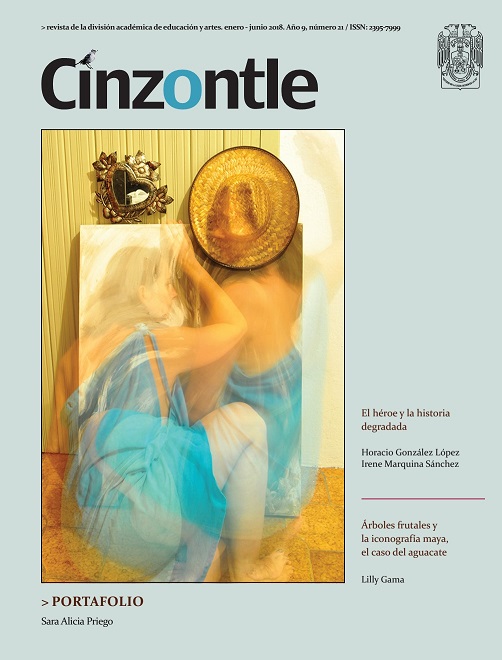El héroe y la historia degradada
Resumen
El pensamiento cotidiano del México actual, soslaya la oposición de los conceptos de Héroe, de Guerrero y de Protector. Para el pensamiento cotidiano del México actual, el Héroe es un concepto singularizado, cuya referencia estricta es el guerrero egoísta, centrado en él mismo, o el protector valiente que, en solitario, salva a alguien de un peligro presente o eminente. Esta singularización es análoga a la actualmente observada en declaraciones como “buen día”. Ella es parte del proceso social de anulación de los conceptos de: Precedentes; de Interrupción Histórica (Kairós); de Aion; de Inicio y Final de toda narración; y del concepto de Héroe social que hace de los valores sociales su destino y el destino de la Historia. Este trabajo busca explorar la relación entre, de un lado, las figuras de Héroe, de Guerrero y de Protector, y de otro lado, los juegos de continuidad-interrupción que conforman la dinámica de la Historia. En esa perspectiva, el trabajo aborda las ideas generales implicadas en tres distintas narrativas literarias, de corte épico, las cuales son ejemplo de la continuidad e interrupción de esas figuras.
Referencias
-Beougher, David B. (2007). Brian Boru: King, High-King, and Emperor of the Irish. Doctor of Philosophy Thesis. State College, PA., Pennsylvania State University. The Graduate School. College of Liberal Arts.
-Bernstein, J. M. (1997). The Philosophy of the Novel: Lukács, Marxism and the Dialectics of Form. Minneapolis, MN., The University of Minnesota Press.
-Borges, Jorge Luis (1975). El Libro de Arena. Buenos Aires, EMECE.
-Borges, Jorge Luis (2011). “Pierre Menard, autor del Quijote”. En: Jorge Luis Borges (Autor). Ficciones. México, De bolsillo: 39-53.
-Byars, Oraleze D. (2009). Myth management: The nature of the hero in Callimachus’ Hecale and Catullus’ Poem 64. Universityof South Florida, Graduate School Theses and Dissertations. http://scholarcommons.usf. edu/etd
-Charles-Edwards, T. M. (2004). Early Christian Ireland. Cambridge, UK., Cambridge University Press.
-Cox, Ronald R. (1978). Schutz’s Theory of Relevance: A Phenomenological Critique. The Hague, Martinus Nijhoff.
-Cros, E. (2010). “Sociocrítica e Interdisciplinariedad”. Sociocriticism,XXV, 1 y 2: 11-25.
-Escalante Gonzalbo, Fernando (2015). “III. La Vida sin ‘Don Porfirio’”. Nexos, 1 de julio de 2015. www.nexos.com.mx
-Dunning, T. P. and Bliss, A. S. (1969). The Wanderer. London: Methuen.
-Farnell, Lewis Richard (1921). Greek Hero Cults and Ideas of Immortality. Oxford, UK., Clarendon Press.
-Feenberg, A. (1988). “The Question of Organization in the Early Marxist Work of Lukács: Technique or Praxis”. En: Tom Rockmore (Ed.). Lukács Today: Essays in Marxist Philosophy. Sovietica, Vol. 51. Dordrech Reidel Publishing, Dordrecht, Holland: 126-156.
-Finkel, Irving (2014). The Ark before Noah: Decoding the Story of the Flood. London, Hodder and Stoughton.
-Gallery Kovaks, Maureen (1985). The Epic of Gilgamesh. Translator. Stanford, CA., The University of Stanford Press.
-García de la Huerta, Vicente (1786). Lección Crítica a los Lectores de la Memoria de Cosme Damián sobre el Teatro Español. Madrid: Pantaleón Aznar.
-García de la Huerta, Vicente (1785). Theatro Hespañol. Madrid, Imprenta Real.
-George, Andrew R. (2003). The Babylonian Gilgamesh Epic: Introduction, Critical Edition, and Cuneiform Text. Vol. 1. Oxford, Oxford University Press.
-George, Andrew (2007). “The Epic of Gilgamesh: Thoughts on Genre and Meaning”. En: J. Azize and N. Weeks (Eds.), Gilgamesh and the World of Assyria. Proceedings of the Conference Held at the Mandelbaum House, the University of Sydney, 21-23 July 2004. (Ancient Near Eastern Studies Supplement). Leuven, Peeters: 37-66.
-Goldmann, Lucien (1975). Para una Sociología de la Novela. Madrid: Ayuso.
-Hernández, Bertha (2013). “¿Qué ha¬ce el Coronel Díaz en la Colonia del Valle?” La Crónica de Hoy. Jueves 16 de diciembre de 2016. http://www.cronica. com.mx/notas/2015/908796.html
-Jung, C. G. (1959). Aion: Researches into de Phenomenology ofthe Self Princeton, NJ., Princeton University Press.
-Kearns, E. (1989). The Heroes of Attica. London, University of London, Institute of Classical Studies.
-Korthals Altes, Liesbeth (2007). “Gil¬gamesh and the Power of Narration”. Journal of the American Oriental Society, 127, 2: 183-193.
-Lambert, Wilfred George (1996). Babylonian Wisdom Literature. Winona Lake, IN., Eisenbrauns.
-Lukács, Georg (1971). The Theory of the Novel: A Historical-Philosophical Essay on the Forms of Great Epic Literature. London, The Merlin Press.
-Lukács,Georg(2008). DieTheorie des Romans: Ein geschichtsphilosophischer Versuch über die Formen der groben Epik. Berlín, Paul Cassirer. Versión electrónica del Project Gutenberg.
-Meyer, Jean (2015). “I. Una larga Pe¬nitencia”. Nexos, 1 de julio de 2015. www.nexos.com.mx
-Milner, A. (2005). Literature, Culture, and Society. London, Routledge.
-Sefchovich, Sara (2008). México: País de Mentiras. México, Oceáno.
-Sipiora, Phillip and Baumlin, James, S. (2002). “Introduction: The Ancient Concept of Kairos”. En: Phillip Sipiora y James, S. Baumlin (Eds.). Rethoric and Kairos: Essays in History, Theory and Praxis. Albany, NY., State University of New York Press: 1-22.
-Snell, Bruno (1953). The Discovery of the Mind: The Greek Origins of European Thought. Oxford, Basil Blackwell.
-Urzainqui, Inmaculada (1997). “Poé¬tica Teatral: Presencia y Prestigio de los Críticos Extranjeros”. En: Francisco Lafarga (Ed.). El Teatro Europeo en la España del Siglo XVIII. Lleida, España. Edition Universitat de Lleida: 15-60.
-Watt, I. (2001). The Rise ofthe Novel: Studies in Defoe, Richardson, and Fielding. Los Angeles, CA., The Universi¬ty of California Press.
-Westenholz, Aage y Koch-Westenholz, Ulla (2000). “Enkidu —The Noble Savage?” En: Andrew R. George y Iving L. Finkel (Eds.). Wisdom, Gods, and Literature: Studies in Assyriology in Honour of W. G. Lambert. Winona Lake, IN., Eisenbrauns: 437-452.
-White, Eric Charles (1987). Kaironomia: The Will to Invent. New York, NY., Cornell University Press.
-Ziogas, Ioanni (2013). Ovid and Hesiod: The Metamorphosis of the Catalogue of Women. Cambridge, UK., Cambridge University Press.


